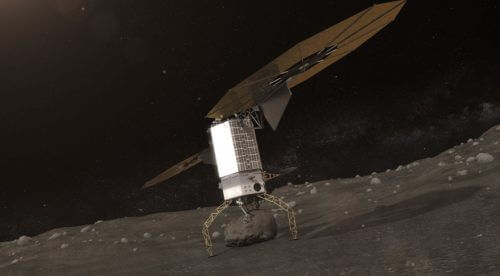Despite the extensive budget cuts to civilian agencies and offices, NASA was not significantly affected by the Trump administration's 2018 budget proposal. If the proposal is approved by Congress, NASA's budget will decrease from $19.3 billion to $19.1 billion. The agency's Earth exploration programs were not significantly affected as some had assumed, and the agency's planetary research budget would actually increase according to the proposal.

Trump administration Posted yesterday the outlines of the budget proposal for 2018. Although the full and detailed proposal will not be published until May, the published outlines give evidence for the first time of the Trump administration's future intentions regarding the US space program.
Trump's budget proposal includes extensive cuts in civilian agencies and offices, to balance an additional $54 billion in the defense budget. For example, the Environmental Protection Agency (EPA) will suffer a cut of 2.6 billion dollars - 31% of its current annual budget. Compared to it and compared to many other civilian ministries, NASA will suffer a relatively small cut: its budget will decrease from 19.3 to 19.1 billion dollars, that is, a cut of 0.8%.
It is important to emphasize that the last word regarding the budget is determined by the American Congress, and not by the president, so it is very likely that the final budget that will be approved will be different, and perhaps very different, from the proposed budget. For example, the Obama administration's 2016 budget proposal for NASA was $18.5 billion, but Congress eventually approved A budget of 19.3 billion dollars.
Several key points that emerge from the budget proposal regarding NASA:
- 3.7 billion dollars will be awarded to continue the development of the SLS heavy launcher, the Orion spacecraft and related ground infrastructure, which NASA is developing with the aim of launching astronauts into "deep space", beyond orbit around the Earth. This is the same amount as that given this year.
- 1.8 billion dollars will be awarded to Earth exploration programs - 102 million dollars less than the current annual budget of these programs. This is indeed a significant cut, but much less than the extensive cut that many feared would happen. As part of the cut, several tasks that are in development and have not yet been launched will be cancelled. Somewhat strangely, the cessation of funding for the Earth imaging devices of the DSCOVR probe, which has already been launched into space, and the cost of operating them is only 1.2 million dollars (The photos, by the way, are spectacular in their beauty). The proposed cut will also occur in grants for research in the field.
- $1.9 billion will be awarded to the agency's robotic planetary exploration programs. This is an increase from the 1.63 billion dollars allocated to these programs in 2016.
- The proposal emphasizes the administration's support for the launch of a rover to Mars in 2020 and the development of a probe for the Europa moon of the planet Jupiter, which instead of entering orbit around the moon, will make many fast flybys near it (to avoid Jupiter's dangerous radiation belts). The planned probe received recently Official name, "Europa Clipper", after that The clipper ships The speed from the 19th century.
- Cancellation of development Europa landed on the moon, although this was in any case only a preliminary concept (as a separate mission from the Clipper probe mentioned above). The cancellation is explained by the desire to "maintain a balance in the portfolio" of the agency's planetary research missions, and "to preserve the flexibility in performing missions defined as more important by the scientific community."
- Complete cancellation of the "Asteroid Redirect Mission", the development of which was initiated by the Obama administration. Its purpose was to capture a massive rock on a near-Earth asteroid, bring it into orbit around the moon, and later send astronauts to it to take samples back to Earth. One of the main goals of the program was to create a research target for extremely powerful ion engine technology, which would eventually support missions to Mars. The program did not receive widespread support from both the scientific community and Congress, so its end is not a big surprise.
- Complete cancellation of NASA's "Ministry of Education"., whose budget is 115 million dollars. The proposal claims that the office is experiencing "significant challenges in the implementation of NASA's extensive education strategy" and that its activities are duplicated with other organizations in the agency.
For the outline of the 2018 budget proposal regarding NASA
Watch Mick Mulvaney, director of the White House Office of Management and Budget, answer a question about the NASA budget at a press conference yesterday:
